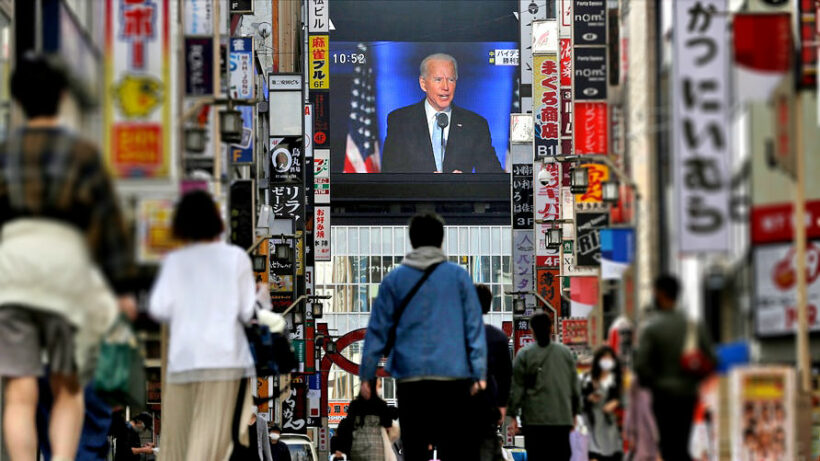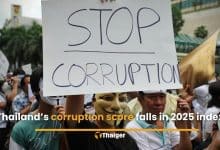South East Asian leaders foreshadow a pivot to the US in the new administration

So what will the presidency of US President-elect Joe Biden mean for south east Asia? And how will it differ from the administration of President Trump?
South east Asia already knows Joe Biden from his term as US vice president from 2008 – 2016, and his “Asia pivot” that provided high-level diplomacy and resources with strategic trade relationships. The Obama-era administration maintained a prickly but ongoing relationship with China and was supportive of the greater region’s checks on China’s march.
President Trump’s relationship with ASEAN has been marked with more defence sales, trade deals and an aggressive stance on trade with China that brought some advantage to south east Asia’s manufacturing powerhouses, including Thailand.
But Trump also pulled out of the Trans-Pacific Partnership after years of talks on the world’s largest low-tariff trade zone. This left ASEAN leaders wondering if the US could still be a reliable trading partner, pivoting the bloc to seek free-trade options elsewhere. This weekend the ASEAN leaders are expected to sign a rival trade deal, the Regional Comprehensive Economic Partnership, anchored by China. The trade deal will form the largest trading bloc in the world, and excludes the US.
But economic analysts predict the Biden presidency will see America as a more visible ally and supporter of the ASEAN nations.
It’s also predicted that there will be a more hands-on approach to relationships in the region whereas the Trump administration often skipped important regional meetings. Meanwhile Chinese delegations attended all the same meetings.
The fractious trade war with China over the past 2 years has also left a mark on regional trade with winners and losers emerging in the region’s export and manufacturing-reliant economies.
Some countries clearly benefitted from the toxic US-China shock, as supply chains shifted in their direction. Others lost investment from Chinese companies that suffered under the trade restrictions.
Most of the ASEAN leaders, plus the Chinese leadership, have now sent their congratulations to President-elect Biden and are already preparing to court favour with the projected White House administration when it takes over control of the trade levers on January 20, 2021.
Thai PM Prayut Chan-o-cha, heading up south east Asia’s second biggest economy and Washington’s oldest Asian ally, earlier this week said he “looks forward to working closely” with the incoming president. Halimah Yacob, Singapore’s president, praised the president-elect and his running mate, Vice President-elect Kamala Harris.
“This is the historic moment for women minorities in the US and around the world.”
The Chinese foreign ministry sent this message… “We respect the choice of the American people. We congratulate Mr. Biden and Ms. Harris.”
Taiwan’s government has also sent its good wishes to the administration-elect.
Kavi Chongkittavorn, a Bangkok veteran diplomatic commentator says that Joe Biden will “pay attention to issues related to human rights and democratic development, which has been overlooked by the Trump administration.”
Kavi pushes the case that President Trump “paid less public attention than his predecessors to pro-democracy movements and questions of human rights”, dismaying activists from Thailand to Cambodia. Analysts say that situation served to embolden regional ‘strongmen’ such as Philippine President Rodrigo Duterte and Cambodian PM Hun Sen, as well as the former-generals who cobbled together Thailand’s quasi-democratic government, and even Vietnam’s communist leadership.
“Biden will be more attentive and zero-in on Thailand and its future strategic role.”
But ASEAN officials, ahead of meetings in Vietnam this week, say the main concern remains the rapid advance of China’s power. China is now the biggest trading partner with ASEAN and has its eyes firmly set on dominating the South China Sea, as well as completing a network of debt-funded infrastructure projects to realise its Belt and Road Initiative ambitions.
Trump had promised to turn up the economic and military heat on China in a second term, offering south east Asian states—an area his administration defined as the Indo-Pacific—valuable leverage in their negotiations with their neighbourhood superpower.
Biden will have to address the same concerns, experts say.
Le Hong Hiep, an academic at the Contemporary South East Asia ISEAS, the Singapore-based Yusof Ishak Institute, says that Joe Biden will have to seize the chance to remake old friendships.
“No matter who runs the White House, there’s still an increasing convergence of strategic interests in the South China Sea and bilateral economic ties are still flourishing.”
SOURCE: VOA | Reuters
Latest Thailand News
Follow The Thaiger on Google News:


























